Episodes
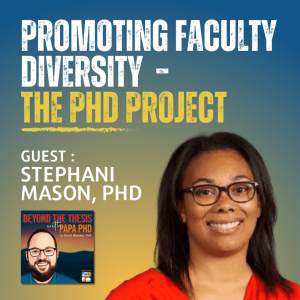
Thursday Jun 27, 2024
Thursday Jun 27, 2024
Welcome to Beyond the Thesis with Papa PhD! In today's episode, I'm thrilled to have Dr. Stephani Mason join us. Dr. Mason, an associate professor of accounting at DePaul University, is renowned for her impactful work on diversity and representation in academia and beyond. Today, we dive into the transformative impact of PhD programs on career paths and the vital role of researchers in non-academic settings and into the raison d'être of The PhD Project - pomoting diversity in faculty in the accounting/economics space. Join us as Dr. Mason shares insights on preparing individuals to utilize their talents for the public good, the importance of evidence-based decision-making, and the power of mentorship through initiatives like The PhD Project. Listen in to learn how this groundbreaking project has been diversifying corporate America and academia for 30 years, helping underrepresented minorities pursue PhDs in business disciplines. Whether you're interested in educational equity, the PhD journey, or the transformative power of diversity, this episode is packed with wisdom and inspiration!
Dr. Stephani Mason is an Associate Professor of Accounting at DePaul University, where she teaches advanced-level undergraduate and graduate courses in accounting and valuation. She earned her Ph.D. in accounting at Rutgers University, her MBA in finance and accounting at the University of Chicago, and her BS in accounting at North Carolina A&T State University. With over a decade working in investment management at JP Morgan Investment Management, the JP Morgan Private Bank, and US Trust, she conducts academic research on accounting/auditing standards, financial regulation, as well as diversity in the accounting and finance industries. Mason serves as a member of The PhD Project Advisory Council (PAC-15), the Black Alliance of Colleges and Employers (BACE) board of directors, the AICPA National Accreditation Commission, Business Valuation Task Force, and Financial Instruments Advisory Group, and the American Accounting Association Meetings Committee and Diversity Initiative. In addition, she is a long-term committee member of the Canadian Academic Accounting Association, British Accounting and Finance Association, European Accounting Association, and Accounting and Finance Association of Australia and New Zealand; is an editorial board member of five academic journals, and founded the WonderWomen of Diversity, a group that hosts discussions about diversity, equity, and inclusion in both the academic and corporate settings.
What we covered in the interview:
Broadening Horizons Beyond Academia: Dr. Mason discussed the critical need for researchers in non-academic roles, highlighting examples from the medical field and public policy institutions, showing how PhDs can solve complex real-world problems.Diversity and Representation: Emphasizing the importance of diverse perspectives in decision-making, Dr. Mason brings attention to how representation in academia and various professions can close the gap between students' aspirations and career paths, enriching education for all.Supportive Communities and Mentorship: The PhD Project, celebrating its 30th anniversary, provides a supportive network for underrepresented individuals. Mentorship, coaching, and events help individuals navigate their academic journeys and promote diversity in both academia and corporate America.🔗See the resources section below for links!
This episode’s resources:
Website: PhDproject.orgFacebook: Facebook.com/thePhDprojectLinkedin: Linkedin.com/company/thephdproject
Thank you, Dr. Stephani Mason!
If you enjoyed this conversation with Stephani, let her know by clicking the link below and leaving her a message on Linkedin:Send Dr. Stephani Mason a thank you message on Linkedin!Click here to share your key take-away from this interview with David!
Leave a review on Podchaser !
![Pushing Through Obstacles in Graduate School with Joe Makkerh [Rerun]](https://pbcdn1.podbean.com/imglogo/ep-logo/pbblog20665444/e9f209295665cea9dc5141740c097efa_300x300.png)
Thursday Jun 20, 2024
Thursday Jun 20, 2024
In this episode of Beyond the Thesis with Papa PhD I bring you a treasure from the vault from season 1 of the podcast – my conversation with Joe Makkerh, who shares remarkable journey from the rigours of academic research to the pharmaceutical industry, and ultimately to becoming a business owner. Joe shares invaluable insights on the importance of being approachable, of selflessly helping others, and on the courage to seek help when you need it.In it we delve into the romanticized perception of academia often portrayed in the media versus the actual resilience needed to overcome the failures that are part and parcel of the scientific process. During our conversation we discussed the solitary nature of academic research projects and the blurred lines between personal life and work, exacerbated by the guilt associated with taking time off work—something many graduate students grapple with.We touch upon critical skills acquired during graduate studies, such as problem-solving, rapid research, and data simulation, and their lasting impact on professional life. Joe opens up about his transition from academia to industry, the value of maintaining a strong network, and the importance of continual learning and personal growth.Stay tuned as Joe recounts fascinating anecdotes illustrating the important balance between competition and cooperation in academia. This episode is packed with advice for young graduates, emphasising employability, understanding finance, and the crucial role of relationships in career success.Don’t miss this touching conversation filled with wisdom and practical tips on navigating both academic and professional landscapes. Be sure to subscribe to "Beyond the Thesis with Papa PhD" for more inspiring stories and insightful discussions about life after the PhD.
Joe Makkerh is a former scientist, now an entrepreneur working in high-end audio. Since finishing his PhD in cellular and molecular zoology, Joe transitioned from researcher to academic administrator to MBA student to business owner. His academic career has taken him from London to Heidelberg, to Montreal, where he now develops his business.
What we covered in the interview:
The Power of Asking for Help: Many graduate students struggle with seeking assistance beyond their academic work. It's crucial to realise that asking for help is a strength, not a weakness. Building a supportive network can make a significant difference.Transitioning from Academia to Industry: Moving from the world of academic research to the pharmaceutical industry offered Joe Makkerh valuable lessons in resilience and dealing with failure. Embracing these challenges head-on is key to personal and professional growth.Maintaining Work-Life Balance: The blurred lines between personal life and work can take a toll on health and relationships. Prioritising self-care and setting boundaries is essential for long-term success and wellbeing.
This episode’s resources:
Website: baetisaudio.com
Thank you, Joe Makkerh!
If you enjoyed this conversation with Joe, let him know by clicking the link below and leaving him a message on Linkedin:Send Joe Makkerh a thank you message on Linkedin!Click here to share your key take-away from this interview with David!
Leave a review on Podchaser !
Support the show !
You might also like the following episodes:
Vikie Pedneault – Engaging Through ComedyAndy Churchill –Presenting for ImpactAmani Said – How to Make impact with Your CareerInes Thomas Almeida – A Winding Journey From Biology to MusicologyAs always, if you find value in Papa PhD and in the content I bring you every week, click on one of the buttons below and send some of that value back to me by becoming a supporter on Patreon or by buying me a coffee :)
Support the show on Patreon !
Or buy me a coffee :)
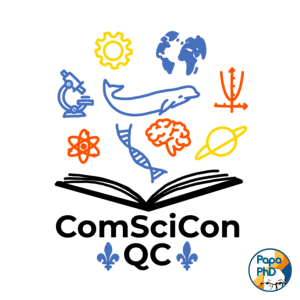
Thursday Jun 13, 2024
Thursday Jun 13, 2024
Dans ce nouvel épisode d'Au-delà de la thèse avec Papa PhD, je plonge au cœur du congrès ComSciCon 2024 pour explorer les évolutions marquantes de l'événement au cours des cinq dernières années et pour avoir le témoignage des jeunes scientifiques qui y participent cette année. Découvre c'est quoi ComSciCon Québec, l'importance grandissante de la communication scientifique pour les jeunes scientifiques et les ateliers innovants proposés durant les trois jours du congrès pour enrichir tes compétences. Mes invité·e·s partagent leurs expériences, l'impact de la communication scientifique sur leur carrière, et l'influence positive de la diversité et de la collaboration dans une communauté dynamique et fleurissante. Ne manque pas cette immersion inspirante dans l'univers de ComSciCon QC, ton tube à essai pour apprendre à vulgariser !
Dans cet épisode, j'ai discuté avec Marion Cossin, Gaële Lajeunesse, Berthié Gouin-Ferland et Billie Maubois de l'évolution de ComSciCon au cours des cinq dernières années. On a parlé du concept de ComSciCon Québec et des activités marquantes de cet événement. Tu découvriras comment Marion a su marier ses talents artistiques et scientifiques, comment Berthié trouve de la sérénité dans la communication, et comment Billie a redécouvert sa voix de vulgarisatrice et tu entendras aussi les témoignages de personnes de la cohorte 2024 sur leur expérience dans cette édition 2024 du congrès. Ensemble, ils ont parlé de l'importance pour eux de la culture de respect et d'inclusivité au sein de l'équipe organisatrice, et de l'impact positif de l'événement sur leur parcours professionnel et personnel.Installez-toi confortablement et préparez-toi à être inspiré·e par ces parcours riches et variés, tous réunis par une même passion : rendre la science accessible et fascinante pour tous. Bonne écoute !
On a parlé, entre autres :
De l'importance de la communication scientifique : Marion Cossin et Berthié Gouin-Ferland soulignent comment la communication scientifique aide les jeunes scientifiques à relier des intérêts variés, leur apporte de la sérénité, et leur facilite l'accessibilité et la confiance.De diversité et inclusion au cœur de ComSciCon QC : L'événement favorise une ambiance collaborative et sécuritaire, mettant en avant l'accessibilité aux experts et la reconnaissance du congrès. L'équipe crée une culture de respect, de communication et d'inclusivité au sein de l'équipe et de la cohorte.De l'évolution et de l'impact de ComSciCon QC : Les anciens participants publient dans des grands journaux et réalisent diverses initiatives de vulgarisation et représentent ainsi l'impact durable de l'événement sur les carrières dans la communication scientifique.Tu aimes Papa PhD ? Laisse-moi un commentaire > ici < - une courte phrase suffit ! Et inclus ton identifiant Twitter – comme ça je pourrai te remercier personnellement !Si cet épisode spécial ComSciCon QC t'a plu, fais-leur en part en cliquant sur le lien ci-dessous et en leur laissant un message sur LinkedIn :Clique ici pour remercier l'équipe ComSciCon QC sur Linkedin !Clique ici pour partager avec David le principal message que tu retiens de cet épisode !Si tu trouves de la valeur dans le contenu que je t'apporte chaque semaine, clique sur l'un des boutons ci-dessous et renvoie-moi l'ascenceur :)
Don sur PayPal
Deviens supporter sur Patreon !
Ou paye-moi un café :)
Tu aimeras aussi ces épisodes :
Thèsez-vous ! – Écrire sa thèse une tomate à la fois : PapaPhD.com/thesez-vous-adtCarine Monat - Bâtir un trajet qui nous ressemble : PapaPhD.com/Carine-MonatRémi Quirion – Projeter les jeunes chercheur.e.s dans des carrières d'avenir : PapaPhD.com/203Michel Lacasse – Devenir parent pendant le doctorat : PapaPhD.com/Michel-Lacasse-adt
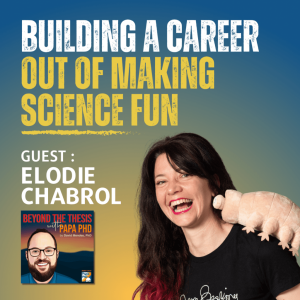
Thursday Jun 06, 2024
Thursday Jun 06, 2024
In this new episode titled "Building a Career Out of Making Science Fun", I sit down with the ever-enthusiastic Elodie Chabrol to dive into the world of science communication. During our conversation, Elodie shares her inspiring journey from a traditional research career to becoming a full-time freelance science communicator.Throughout our conversation, Elodie talks about the challenges and rewards of her career shift and about her overarching goal of countering misinformation through effective science communication. Join us for this energetic conversation and discover how science can be both enlightening and entertaining while bridging the gap between scientific communities and the general public.
Elodie Chabrol has a PhD in Neurogenetics and is the international director for the Pint of Science festival. She is also a freelance science communicator involved in different freelance projects like training, moderations and podcasts.Elodie's mission is to make science accessible to everyone, everywhere show the human side of it.
What we covered in the interview:
Transforming Science Communication: Discover how Elodie has contributed to making science fun and relatable for non-specialist audiences.Pint of Science Festival: Learn about the international festival that brings science to local pubs, offering a relaxed, interactive environment for exchanges with the people behind the research.Inspiring Young Researchers: Elodie discusses how taking part in science communication events helps budding scientists communicate their research effectively and think outside their academic box.Personal Insights: Hear anecdotes from Elodie's journey, including how science communication helped her redefine her identity and broaden her professional horizons.🔗See the resources section below for links!
This episode’s resources:
Website: www.elodiechabrol.com/Twitter: @eloscicomm
Thank you, Elodie Chabrol!
If you enjoyed this conversation with Elodie, let her know by clicking the link below and leaving her a message on Linkedin:Send Elodie Chabrol a thank you message on Linkedin!Click here to share your key take-away from this interview with David!
Leave a review on Podchaser !
Support the show !
You might also like the following episodes:
Vikie Pedneault – Engaging Through ComedyAndy Churchill –Presenting for ImpactAmani Said – How to Make impact with Your CareerInes Thomas Almeida – A Winding Journey From Biology to Musicology
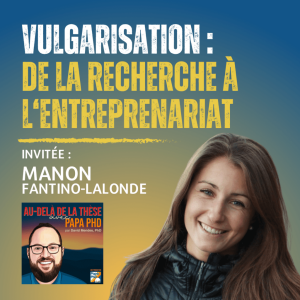
Thursday May 30, 2024
Thursday May 30, 2024
Bienvenue dans ce nouvel épisode d'Au-delà de la thèse avec Papa PhD intitulé "Vulgarisation : de la recherche à l’entreprenariat" ! Dans cette entrevue avec Manon Fantino-Lalonde je discute de la vulgarisation scientifique et de son lien avec l'entrepreneuriat scientifique.Au fil de notre conversation, Manon partage son parcours, de son passage par la compétition sportive en France à sa passion pour la nutrition. Ensemble, nous avons a tracé des liens entre la diversité des pratiques et des routines nécessaires à la performance de haut niveau en ski alpin et son approche multidisciplinaire en recherche et en entrepernariat.Une conversation inspirante à ne pas manquer !
Après avoir terminé un premier diplôme en diététique en France, Manon a poursuivi ses études à la Faculté de médecine de lUniversité de Montréal en obtenant un baccalauréat, puis une maîtrise en nutrition. Elle est nutritionniste et membre de l'Ordre professionnel des diététistes du Québec (ODNQ) depuis 2019. Actuellement en deuxième année de doctorat à l'Université McGill, ses recherches visent à mieux comprendre le rôle des facteurs génétiques et environnementaux sur les comportements alimentaires et le risque de maladies cardiométaboliques. Elle a eu l'occasion de présenter une partie de ses recherches lors de la finale de "Ma thèse en 180 secondes" de McGill, où elle a remporté le premier prix dans la catégorie francophone.
Avec Manon, on a parlé, entre autres :
De l'importance de profiter de tous les services que vous offre votre université pour enrichir votre parcours académique.De la complémentarité entre la recherche académique et l'entrepreneuriat.De de l'effet de levier qu'apporte la vulgarisation à différents plans de votre vie de jeune scientifique.De la vision de Manon pour les années à venir, au plan de la recherche et au plan entreprenarial.Tu aimes Papa PhD ? Laisse-moi un commentaire > ici < - une courte phrase suffit ! Et inclus ton identifiant Twitter – comme ça je pourrai te remercier personnellement !
Merci Manon !
Si cet entretien avec Manon Fantino-Lalonde t'a plu, fais-lui en part en cliquant sur le lien ci-dessous et en lui laissant un message sur LinkedIn :Clique ici pour la remercier sur Linkedin !Clique ici pour partager avec David le principal message que tu retiens de cet épisode !Si tu trouves de la valeur dans le contenu que je t'apporte chaque semaine, clique sur l'un des boutons ci-dessous et renvoie-moi l'ascenceur :)
Don sur PayPal
Deviens supporter sur Patreon !
Ou paye-moi un café :)
Tu aimeras aussi ces épisodes :
Olivier Hernandez – Du génie à l'industrie à l'astrophysique : PapaPhD.com/Olivier-Hernandez-Pt1Erika Dupont – Le parcours doctoral est-il au service des jeunes chercheur·e·s ?Rémi Quirion – Projeter les jeunes chercheur.e.s dans des carrières d'avenir : PapaPhD.com/203ComSciCon Québec – ComSciCon QC - Ton tube à essai pour apprendre à vulgariser
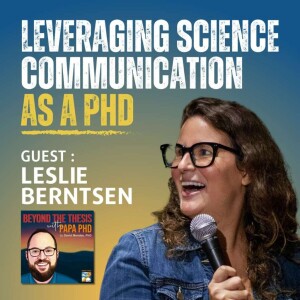
Thursday May 23, 2024
Thursday May 23, 2024
Storytelling is not just a tool for entertainment; it is a powerful medium for communicating complex ideas in a relatable and impactful manner. In this episode of Beyond the Thesis with Papa PhD, Dr. Leslie Berntsen highlights why leveraging science communication is important, as a PhD, and how embedding your results within personal stories makes science more accessible and engaging to the general public. Adding this human touch to how we talk about science allows us to bridge the gap between the scientific community and non-academic audiences.
Dr. Leslie Berntsen is a social scientist, once-and-former college professor, and the current Director of Education and Research at The Story Collider. She specializes in inclusive pedagogy, teaching social issues, and popular science communication and is the recipient of four national teaching awards from the Society for the Teaching of Psychology and the Society for the Psychological Study of Social Issues over a seven year period. (She tries to remain as chill about this as a person possibly can.) Leslie’s writing has been featured in The Chronicle of Higher Education, Science, and The Huffington Post, and you can also find the earliest drafts of her forthcoming op-eds on Twitter – which she will stubbornly continue to use until the very last server crashes. Her high school debate team once named her “Most Likely to Color-Code Her Plans to Grassroots Resistance” and she has – with no effort required – been living up to it ever since.
What we covered in the interview:
The Human Side of Science: Through her work with Story Collider, Leslie aims to highlight the human side of science by tying it to personal experiences and real-life scenarios.Career Development through Storytelling: Leslie sheds light on the value of introspection and self-awareness in developing character and career skills. Whether it is for job interviews, academic presentations, or grant applications, storytelling can be a powerful arrow in a young researcher's quiver.Story Fellows Programs: Story Collider fosters initiatives that encourage university students to use storytelling for public scholarship and science communication. These programs involve workshops where participants craft and present their science-related stories on stage.🔗See the resources section below for links!
This episode’s resources:
3 Story Collider storiesNina Christie (harm reduction researcher with a very personal connection to the work)Jaclyn Siegel (anorexia researcher dealing with her own anorexia)Rebecca Brachman (accidentally injected herself with diptheria toxin)Papers on the effects of jargon in science papersThe negative effects of jargon on readers' interest for science and scientific fluency – Shulman et al., 2020 ; Bullock et al., 2019The negative effect of jargon in paper titles on citation – Martinez et al., 2021Leslie's socialsWebsite: leslie-bern.com/contactTwitter: @leslie_bern Carrier pigeon sent to her home 🕊️The Story ColliderListen to the podcastAttend a live show in any of the Home Stage citiesLearn more about their educational programming + plot with them to help bring a STEM storytelling fellowship program to your university: workshops@storycollider.org
Thank you, Leslie Berntsen!
If you enjoyed this conversation with Leslie, let her know by clicking the link below and leaving her a message on Linkedin:Send Leslie Berntsen a thank you message on Linkedin!Click here to share your key take-away from this interview with David!
Leave a review on Podchaser !
Support the show !
You might also like the following episodes:
Sue Ashford – Preparing for life as a PhDJessica Schleider –Dealing With Mental Unrest in Graduate SchoolJonathan Adler – Avoiding Career Narrative PitfallsGloria Mark – Optimizing Focus and AttentionAs always, if you find value in Papa PhD and in the content I bring you every week,
![Managing Your Imposter Experience During and Beyond Your Degree with Marc Reid [Rerun]](https://pbcdn1.podbean.com/imglogo/ep-logo/pbblog20665444/585150495e7541ea9ce3aab04dc2150b_300x300.jpg)
Thursday May 16, 2024
Thursday May 16, 2024
This week on Beyond the Thesis With Papa PhD, I am bringing you a listener favorite about the imposter phenomenon in academia and beyond – my Season 4 conversation with Marc Reid, PhD, author of You Are Not a Fraud - A Scientist's Guide to the Imposter Phenomenon.Imposter feelings are ubiquitous in graduate school and throughout your career, especially after pivots into a new position or a new space.Marc has put a lot of thought into this question and I am super grateful he could come on the show and share his experience dealing with imposter feelings in his own life as a young researcher and what drove him to write a book on the subject.Also, I'd love to get to know you better! If you have 2 minutes, please fill out the Papa PhD listener survey by clicking on this link. Donate to the show and Support this podcast.Marc was born and raised in Glasgow, Scotland.He completed his Masters and Carnegie Trust-sponsored PhD in Chemistry at the University of Strathclyde. Marc was then a postdoctoral research associate at the University of Edinburgh. During that time, he was inducted into the SciFinder Future Leaders in Chemistry programme.Marc’s independent academic career has been fuelled by prestigious Leverhulme Trust and UKRI Future Leaders Fellowships. He has held lecturing positions at the University of Bristol and the Hunter Centre for Entrepreneurship. In 2021, Marc completed the altMBA.His research interests include physical organic chemistry, computer vision, virtual reality, process safety, and the Imposter Phenomenon.He lives with his wife, two kids, and border terrier in 'sunny' Glasgow.
Thank you, Marc Reid!
If you enjoyed this conversation with Marc, let him know by clicking the link below and leaving him a message on LinkedIn:Send Marc Reid a thank you message on Twitter!Click here to share your key take-away from this interview with David!
This episode’s resources:
Marc Reid | LinkedinMarc Reid | FacebookYou Are Not a Fraud | Get Marc's bookMarc’s list of failures wouldn’t fit on a short biography (see: https://www.dr-marc-reid.com/cv-of-failures).
Leave a review on Podchaser !
Support the show !
You might also like the following episodes:
Martha Boeglin – Unlocking Your Thesis Writing Super Powers
Anushka Khasnobish – The Power of Mentorship During a Career Pivot
Terence Milstead – A Roadmap to Pivoting Into the Private Sector
Natalia Bielczyk – Figuring Out Where You Fit in the Job Market as a PhDAs always, if you find value in Papa PhD and in the content I bring you every week and if you're not a nerd like me and don't want to delve into Podcast 2.0, click on one of the buttons below and send some of that value back to me by becoming a supporter on Patreon or by buying me a coffee :)
Support the show on Patreon !
Or buy me a coffee :)
Get the Papa PhD Career Readiness Tool kit !
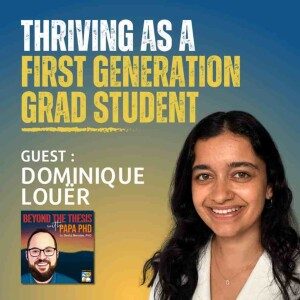
Thursday May 09, 2024
Thursday May 09, 2024
In this week's episode of Beyond the Thesis With Papa PhD, I sat down with the Dominique Louër, a 4th-year PhD candidate at McGill University. Dominique shared her journey as a first-gen graduate student overcoming multiple challenges, from losing a supervisor to facing down imposter syndrome. Despite the hurdles she faced, Dominique championed a passion for neurolinguistics and clinched victory at the recent McGill 3MT final. Her resilience and the importance of mentorship and community in navigating academia shone through her story and will be an inspiration to you. Join us to hear Dominique's invaluable insights on pushing past adversity and thriving in pursuit of academic and personal growth!
Dominique is a fourth-year PhD candidate in Communication Sciences and Disorders at McGill University, specializing in neurolinguistics. Her research explores the intersection of bilingualism, brain function, and aging. She completed her undergraduate studies in linguistics at the University of Winnipeg and went on to earn two master’s degrees at the University of Waterloo in linguistics and psychology, respectively. Drawing from her multidisciplinary background in linguistics and psychology, she advocates for holistic aging solutions, emphasizing the importance of factors like bilingualism in maintaining cognitive health. In her spare time, Dominique enjoys spending time outside, drinking overpriced lattes with friends, and bouldering.
What we covered in the interview:
Resilience in Adversity: Dominique opens up about negative feedback in her early educational experiences, her battle with an autoimmune disease post-COVID-19, and a challenging change of supervisor mid-PhD.Passion as a Driving Force: Despite hurdles, her love for research and he passion for exploring the intersections of bilingualism, brain function, and aging keeps her driven. Dominique's determination to contribute holistic solutions to aging and cognitive health fuels her motivation.A Positive Mindset: Dominique recently won a 3-minute thesis competition, exemplifying her ability to effectively communicate complex scientific ideas. Her story is a testament to the power of perseverance and positive outlook.🔗See the resources section below for links!
This episode’s resources:
Dominique Louër | Twitter
Thank you, Dominique Louër!
If you enjoyed this conversation with Dominique, let her know by clicking the link below and leaving her a message on Linkedin:Send Dominique Louër a thank you message on Linkedin!Click here to share your key take-away from this interview with David!
Leave a review on Podchaser !
Support the show !
You might also like the following episodes:
Sue Ashford – Preparing for life as a PhDJessica Schleider –Dealing With Mental Unrest in Graduate SchoolSheena Howard – How to Leverage Academic BrandingMelissa Gismondi – The Power of Graduate InternshipsAs always, if you find value in Papa PhD and in the content I bring you every week, click on one of the buttons below and send some of that value back to me by becoming a supporter on Patreon or by buying me a coffee :)
Support the show on Patreon !
Or buy me a coffee :)
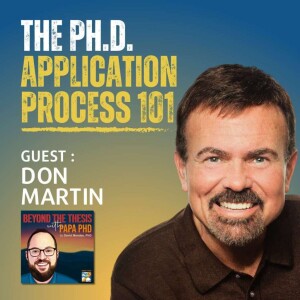
Thursday May 02, 2024
Thursday May 02, 2024
This week on Beyond the Thesis With Papa PhD, I'm thrilled to welcome Don Martin, an expert in graduate enrollment and the founder of Grad School Roadmap. In this episode, Don shares his personal journey from being the first in his peer group to attend college and graduate school to helping others overcome the hurdles of graduate program applications. We delve into the nuances of the graduate admissions process, emphasizing the importance of interpersonal skills, of good recommendation letters, and also why academic credentials aren't the only predictor of success.Join us as we explore why pursuing a PhD depends on more than mere academic achievements and learn how to find the right graduate program that aligns with both your educational and personal aspirations. And stay tuned for the giveaway of five copies of Don Martin's book - Roadmap for Graduate School!
Don Martin spent 28 years in full-time enrollment management, including positions at Columbia, University of Chicago and Northwestern University. He founded Grad School Road Map in 2008 and has coached over 400 Ph.D. applicants since then, with a 97% acceptance rate.
What we covered in the interview:
The Power of Soft Skills: Don emphasizes the critical role of interpersonal relationships, communication skills, and trust in evaluating a candidate's potential, revealing how these factors can often weigh as heavily as academic credentials.Diversity in Graduate Admissions: Don shares inspiring stories of applicants who, despite not fitting the high academic achiever stereotype, have excelled in their fields.Advice for International Students: For international candidates, Don underscores the importance of doing thorough research on graduate programs, focusing on accreditation, community fit, and personal interactions over mere rankings.Navigating Challenges: We discussed the hurdles faced by minorities and underrepresented groups, and explored strategies to boost self-belief and persistence in pursuing advanced degrees.Don's Personal Journey: From being the first in his family to attend college to guiding prospective grad students, Don's personal mission is deeply rooted in his own educational challenges and triumphs, making his advice not only practical but also empathetic.????See the resources section below for links!
This episode’s resources:
Don Martin | WebsiteRoadmap for Graduate School | Book
Thank you, Don Martin!
If you enjoyed this conversation with Don, let him know by clicking the link below and leaving him a message on Linkedin:Send Don Martin a thank you message on Linkedin!Click here to share your key take-away from this interview with David!
Leave a review on Podchaser !
Support the show !
You might also like the following episodes:
Sue Ashford – Preparing for life as a PhDJessica Schleider –Dealing With Mental Unrest in Graduate SchoolSheena Howard – How to Leverage Academic BrandingMelissa Gismondi – The Power of Graduate InternshipsAs always, if you find value in Papa PhD and in the content I bring you every week, click on one of the buttons below and send some of that value back to me by becoming a supporter on Patreon or by buying me a coffee :)
Support the show on Patreon !
Or buy me a coffee :)
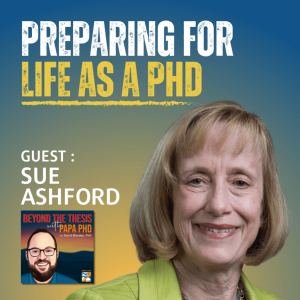
Thursday Apr 25, 2024
Thursday Apr 25, 2024
Welcome to this insightful episode of Beyond the Thesis With Papa PhD, where we delve deep into the complexities of embracing life as a PhD and the broader challenges faced by those in academia, through the prism of our guest's research on high-performing professionals from the gig economy. In this episode I'm joined once again by the Professor Sue Ashford from the University of Michigan, whose prolific research on self-leadership and personal growth sheds light on the unique pressures and opportunities faced by independent workers. Our discussion pivots around the emotional and psychological facets of working outside traditional organizational frameworks—themes that resonate profoundly with both gig workers and academics.
Sue Ashford is the Michael and Susan Jandernoa Professor in the Management and Organizations group at the University of Michigan, Stephen M. Ross School of Business. She has previously taught at the Tuck School of Business at Dartmouth College and received her MS and Ph.D. degrees from Northwestern University.Sue’s passion is using her teaching and research to help people to be maximally effective in their work lives, with an emphasis on self-leadership, proactivity, personal growth, and leadership and its development. Her teaching at the Ross School currently focuses on the executive MBA program (negotiation) and several short-term executive education programs (leadership, change, growth). She also teaches regularly in the Leading Women Executives program of the Corporate Leadership Center and for various companies.Sue is an award-winning scholar, having published papers in the fields’ best journals in the areas of leadership development and leader effectiveness, middle management voice and issue selling, job insecurity, and individual proactivity (e.g., self-management and feedback seeking). Her research has been summarized as advice for managers in the Harvard Business Review, the Harvard Business Review blog, New York Magazine and The Conversation. Sue is a Fellow of the Academy of Management, recognizing the top 10% of scholars worldwide. She was awarded the prestigious Career Achievement Award for Distinguished Scholarly Contributions to Management by the Academy of Management in 2017 and the OB Division Lifetime Achievement Award in 2020. Her recent book, The Power of Flexing: How to Use Small Daily Experiments to Create a Life-Changing Growth (Harper Collins), brings together all of her research and teaching over the years into one place to help people grow their personal and interpersonal effectiveness – to be both successful in today’s world and the person they most want to be.In our conversation, Sue emphasizes the critical importance of maintaining a sense of self-value and the dangers of neglecting self-care, which can lead to burnout and exhaustion. Drawing on her substantial work, including the article "Agony and Ecstasy in the Gig Economy," we explore the concept of 'holding environments' and the significance of creating supportive networks that anchor one’s professional life. Whether you're navigating the solitary waters of a PhD or building your post-PhD career, this episode offers valuable perspectives on building resilience and fostering meaningful connections to thrive in increasingly personalized work landscapes. Join us as we chart these intricate terrains on Beyond the Thesis With Papa PhD!
What we covered in the interview:
Purpose and Self-Value – Understand your WHY to drive productivity and navigate the academic landscape effectively.Intentional Connection – Cultivate relationships that offer support, feedback, and a sense of community. They are as vital as your research.Routine and Flexibility – Learn how small, daily practices can create a framework for innovation and manage the uncertainties inherent in independent work. ???? Sue Ashford's article "Agony and Ecstasy in the Gig Economy" and her book "The Power of Flexing" offer further i...
